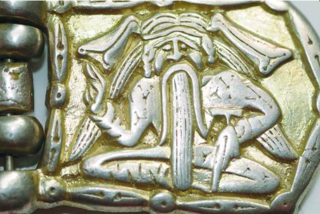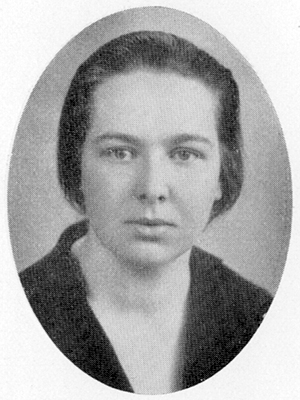Related Research Articles
Dag Prawitz is a Swedish philosopher and logician. He is best known for his work on proof theory and the foundations of natural deduction.

Jukums Vācietis was a Latvian Soviet military commander. He was a rare example of a notable Soviet leader who was not a member of the Communist Party, until his demise during the Great Purge in the 1930s.

In Sami shamanism, Horagalles, also written Hora Galles and Thora Galles and often equated with Tiermes or Aijeke, is the thunder god. He is depicted as a wooden figure with a nail in the head and with a hammer, or occasionally on shaman drums, two hammers.
The Chronicon Salernitanum, or "Salerno Chronicle", is an anonymous 10th century chronicle of the history of the Principality of Salerno. It was probably written around 990 and has been attributed to Radoald of Salerno, Abbot of San Benedetto, by Huguette Taviani-Carozzi. It "has some claims to literary merit" and the "matter is good despite the lack of critical ability which disfigures the work," according to the Catholic Encyclopedia.
In Scandinavian folklore, a rå(in Swedish), is a spirit who is the keeper or warden of a particular location or landform. The rå is known both in Nordic culture and in the Sami culture, where it is called radie.

Ernests Blanks, publicist, the first to publicly advocate for Latvia's independence in 1917.
Serlo of Wilton was a 12th-century English poet, a friend of Walter Map and known to Gerald of Wales. He studied and taught at the University of Paris. He became a Cluniac and then a Cistercian monk, and in 1171 he became abbot of L'Aumône Abbey, a Cistercian monastery between Chartres and Blois. He died in 1181.

Siberia is a vast region spanning the northern part of the Asian continent, and forming the Asiatic portion of Russia. As a result of the Russian conquest of Siberia and of the subsequent population movements during the Soviet era (1917-1991), the modern-day demographics of Siberia is dominated by ethnic Russians (Siberiaks) and other Slavs. However, there remains a slowly increasing number of Indigenous groups, accounting for about 5% of the total Siberian population, some of which are closely genetically related to Indigenous peoples of the Americas.
Soul dualism, also called dualistic pluralism or multiple souls, is a range of beliefs that a person has two or more kinds of souls. In many cases, one of the souls is associated with body functions and the other one can leave the body. Sometimes the plethora of soul types can be even more complex. Sometimes, a shaman's "free soul" may be held to be able to undertake a spirit journey.
Per Stjernquist (1912–2005) was a Swedish law professor who was almost single-handedly responsible for establishing the teaching of the new field of sociology of law in Sweden from the 1960s.

Kurt Almqvist (1912–2001) was a Swedish poet, intellectual and spiritual figure, representative of the Traditionalist School and the Perennial philosophy.

Hungarian shamanism is discovered through comparative methods in ethnology, designed to analyse and search ethnographic data of Hungarian folktales, songs, language, comparative cultures, and historical sources.

Erik Alfred Torbjörn "Björn" Collinder was a Swedish linguist who was Professor of Finno-Ugric Languages at Uppsala University.
Walther Eidlitz, also known as Vamandas and Vimala-Krishna Vidyavinoda Dasa, was an Austrian writer, poet, Indologist and historian of religion.
Ajanbahu Jatbasha is considered by historians to be founder of the Gond dynasty of Chhindwara and Nagpur, which ruled the present days territories of Madhya Pradesh, Chhattisgarh and part of Maharashtra in the 16th-18th centuries. Documentation of his origins and rise to power have not survived, but he is the first historical leader of the mountain Gondi people.

The Skogsrå, Skogsfrun, Skogssnuvan, Skogsnymfen, Råndan or Huldran, is a mythical female creature of the forest in Swedish folklore.

Harald Bergström was a Swedish mathematician, specializing in probability theory.

Greta Arwidsson was a Swedish archaeologist. Alongside other work, she is known for her study of the Valsgärde graves, published from the 1940s until the 1970s.
Tenshō Kōtai Jingūkyō is a Japanese new religious movement which emerged from Shinto. It was established by Sayo Kitamura (1900–1967), with activities beginning in 1945. The movement includes 450,000 members. Kitamura claimed possession by Amaterasu under the title Tenshō-Kōtaijin.

Dag Alvar Strömbäck was a Swedish folklorist, historian of religion and philologist. He was a professor at Uppsala University and also headed the Swedish Institute for Language and Folklore at Uppsala.
References
- ↑ Acta Universitatis Stockholmiensis: Stockholm studies in comparative religion. Almqvist & Wiksell. 1961. p. 68.
- ↑ Acta Universitatis Stockholmiensis: Stockholm studies in comparative religion. Almqvist & Wiksell. 1961. p. 68.